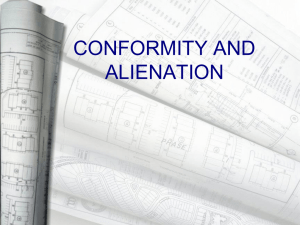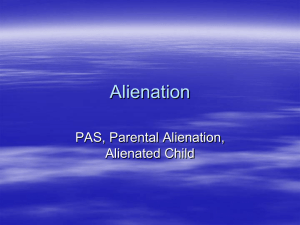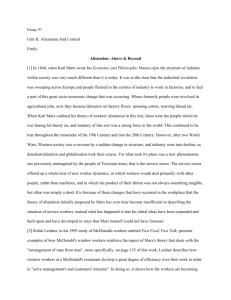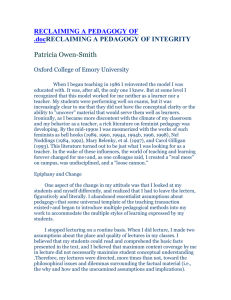Ilyenkov on Shaff
advertisement
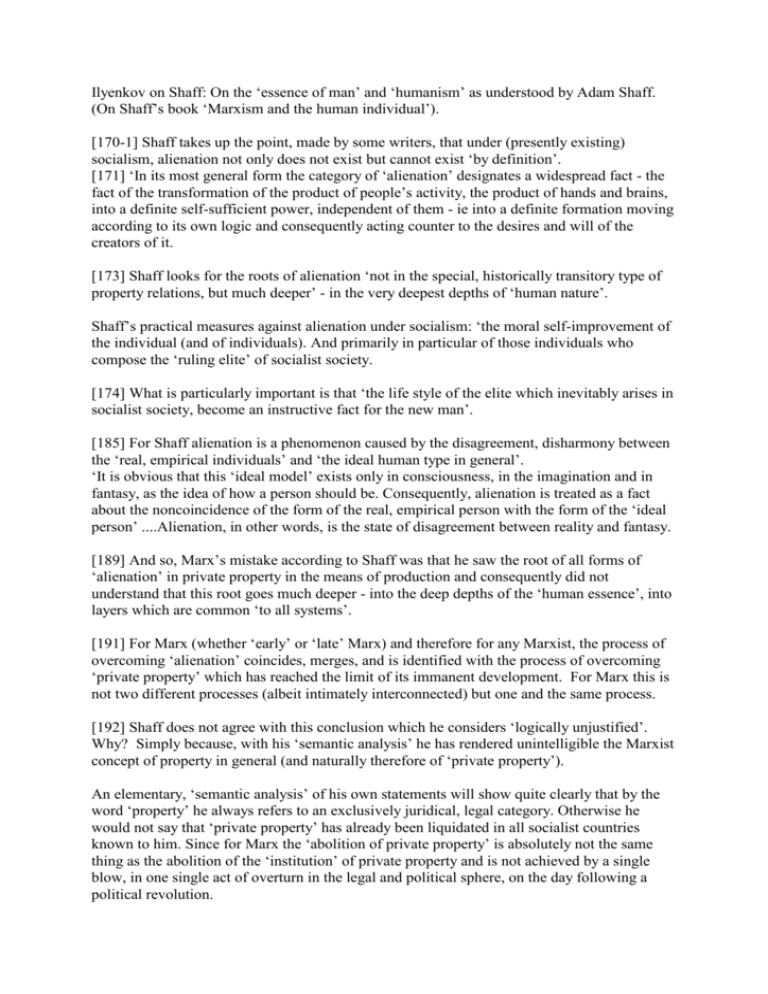
Ilyenkov on Shaff: On the ‘essence of man’ and ‘humanism’ as understood by Adam Shaff. (On Shaff’s book ‘Marxism and the human individual’). [170-1] Shaff takes up the point, made by some writers, that under (presently existing) socialism, alienation not only does not exist but cannot exist ‘by definition’. [171] ‘In its most general form the category of ‘alienation’ designates a widespread fact - the fact of the transformation of the product of people’s activity, the product of hands and brains, into a definite self-sufficient power, independent of them - ie into a definite formation moving according to its own logic and consequently acting counter to the desires and will of the creators of it. [173] Shaff looks for the roots of alienation ‘not in the special, historically transitory type of property relations, but much deeper’ - in the very deepest depths of ‘human nature’. Shaff’s practical measures against alienation under socialism: ‘the moral self-improvement of the individual (and of individuals). And primarily in particular of those individuals who compose the ‘ruling elite’ of socialist society. [174] What is particularly important is that ‘the life style of the elite which inevitably arises in socialist society, become an instructive fact for the new man’. [185] For Shaff alienation is a phenomenon caused by the disagreement, disharmony between the ‘real, empirical individuals’ and ‘the ideal human type in general’. ‘It is obvious that this ‘ideal model’ exists only in consciousness, in the imagination and in fantasy, as the idea of how a person should be. Consequently, alienation is treated as a fact about the noncoincidence of the form of the real, empirical person with the form of the ‘ideal person’ ....Alienation, in other words, is the state of disagreement between reality and fantasy. [189] And so, Marx’s mistake according to Shaff was that he saw the root of all forms of ‘alienation’ in private property in the means of production and consequently did not understand that this root goes much deeper - into the deep depths of the ‘human essence’, into layers which are common ‘to all systems’. [191] For Marx (whether ‘early’ or ‘late’ Marx) and therefore for any Marxist, the process of overcoming ‘alienation’ coincides, merges, and is identified with the process of overcoming ‘private property’ which has reached the limit of its immanent development. For Marx this is not two different processes (albeit intimately interconnected) but one and the same process. [192] Shaff does not agree with this conclusion which he considers ‘logically unjustified’. Why? Simply because, with his ‘semantic analysis’ he has rendered unintelligible the Marxist concept of property in general (and naturally therefore of ‘private property’). An elementary, ‘semantic analysis’ of his own statements will show quite clearly that by the word ‘property’ he always refers to an exclusively juridical, legal category. Otherwise he would not say that ‘private property’ has already been liquidated in all socialist countries known to him. Since for Marx the ‘abolition of private property’ is absolutely not the same thing as the abolition of the ‘institution’ of private property and is not achieved by a single blow, in one single act of overturn in the legal and political sphere, on the day following a political revolution. The abolition of private property (or, what is the same thing, the real socialisation of property) was always understood by Marx as a process of organic, revolutionary transformation of the whole ‘ensemble of social relations’. The process only begins with the expropriation of the capitalist class. The political revolution creates only the legal and political preconditions, the necessary conditions for the ‘abolition of private property’ in all its forms and diverse manifestations (ie all forms of alienation). In order to bring the process to the end, apart from the political revolution, a cultural revolution is required, a revolution in the sphere of the division of labour which overcomes social ‘stratification’ between ‘material’ and ‘mental’ labour, between city and village, etc etc, everything inherited necessarily from the world of private property forms of mutual relation between people, between classes and strata of individuals. This is what is embraced by the capacious concept of property in Marx. For by the word ‘property’ Marx always - in his youth as well as in his old age - understood not a ‘thing’ or a ‘collection of things’ in somebody’s possession and at their disposal, but a process. The process of appropriation by the individual of the objects of nature within and by means of a definite social form. If we understand by ‘property’ a thing (a factory, plant, etc) in its immediately thing-like, technical appearance, then it would not be possible to talk about any kind of dependence between ‘property’ and ‘alienation’. These would be completely different things, as little connected internally as beetroot and music or a tax bill. Here there is no ‘logical contradiction’ or ‘logical identity’ - indeed there is no ‘logical connection’at all. [193] But if on the other hand you understand by property what Marx understood by this term, then the whole thing looks quite different. Then you will get the right to ‘logically’ counterpose these categories as categories of one and the same type. ‘Appropriation’ then in fact is the oppposite of ‘alienation’, it is the same concept but with the opposite value. A close analysis of ‘private property’ will immediately bring out within its structure – in its ‘essence’ – a typical, dialectical relation of opposites: ‘appropriation’ and ‘alienation’. Here we have exactly the same kind of pair as ‘objectification’ and ‘dis-objectification’, ‘purchase’ and ‘sale’, etc etc. One is ‘logically’ unthinkable without the other, because it is objectively impossible ... The meaning of Marx’s analysis of ‘private property’ consisted precisely in identifying the internal dialectic within the category, in showing how ‘appropriation’ realized itself through ‘alienation’ precisely within the confines of this particular form, and that this constituted the ‘essence’, the ‘specific character’ of private property. As a consequence, private property is pregnant with an extremely powerful dialectic: the more the extent of ‘appropriation’ of nature by man grows (ie the scale and power of social production grows), the more ‘alienation’ of man from man increases (in Hegelian philosophical language this is expressed by the alienation of man from himself, as the ‘self alienation’ of man’), in so far as he ‘appropriates nature’s objects’ in private fashion or effects his activity of appropriation as a private, or separate individual. There is an increase in the illusory independence of ‘private individuals’ from one another, ie their real dependence on one another, since their fates are tied by the market into a single knot. Since they are made into puppets in the hands of the anonymous, all powerful forces of the market and begin to play the role imposed on them by the conditions of competition and other mechanisms of market relations .. The collective powers of individuals cooperating in this way being to be counterposed to them as a faceless demon, whose ways are unfathomable. The phenomenon of ‘alienation’ was therefore understood by Marx as an absolutely unavoidable and natural consequence of the process of ‘particularisation’ of one individual from another in the act of ‘appropriation’, the process of isolating one individual from another, ie as the result of the circumstance that each individual makes a common thing (more exactly, takes part in the common business) as a private individual .... He appropriates nature ‘in private fashion’, ie as a ‘private owner’, and therefore his ‘appropriation’ automatically means ‘alienation’ of the object appropriated by him from all other, equally ‘private’ individuals. From the outset, the hegelian formula of ‘alienation of man from himself’ was decoded by Marx as alienation of one person from another person, of one class of individuals from another class of individuals, and in no way as alienation from some mystic ‘essence’, or from some ‘ideal model of man in general’ .... The situation was extremly simple: two private persons, two individuals alienated from one another, two private owners, find themselves in a certain empirically established relation of [194] mutual dependence. That is all. Here is real ‘alienation’ from which Marx severed all the mystifying covering layers of religious, moral, and philosophical illusions. The whole fact of the matter is that between individuals who are alienated from one another, there is not, nor can there be, any medium, any kind of third mysterious subject ‘from which’ they are both ‘alienated’. Individuals who are alienated from one another (ie ‘private’ individuals) have only dreamt up this ‘third participant in the game’ because they have been unable to understand their own mutual relations as relations of ‘alienation’, ie relations of private appropriation of nature’s objects, the private character of the activity of ‘appropriating’ these objects. As a result, they then see themselves as ‘alienated’ from some ‘third’ something or other, while they are actually only ‘alienated’ from one another ... But there never was, is not and never can be some third thing, apart from in their imagination. In this consisted the whole materialistic essence of the conception of ‘alienation’ that Marx developed in dispute with the ‘hegelian’ conception. In this, Marx decisively broke from all illusions about some special ‘essence’ – standing outside of empirical individuals – from which these individuals allegedly ‘fell away’, ‘distanced themselves’ or ‘alienated themselves’. There is no such thing. There are only empirical individuals in their mutual relations, ‘alienated’ from one another. And not from some ideal or idol. However, Adam Shaff is trying to rehabilitate this precise ideological-philosophical interpretation of ‘alienation’, making it look as if the ‘essence of alienation’ consisted in the disagreement between each of these ‘empirical individuals’ with the ‘ideal model’ common to both of them, with the ‘stereotype’, with the icon on which man is pictured not as he really is but as ‘he ought to be’. Nice rehabilitation of the ‘genuine ideas of Marx’! …. But if this is so – if individuals are ‘alienated’ exclusively from one another and not from some icon depicting the ‘ideal stereotype of man in general’ – then the expression ‘alienated character of activity’ becomes a full synonym of the expression ‘private character of appropriation’. This is one and the same thing, only expressed in different ways. Here in reality – and not in the ‘ambiguous hegelian way of expresssing it’ – appropriation is realized through ‘alienation’, through its own opposite. Marx saw the ‘heart of the matter’ precisely in this dialectic, the essence of private property. From here he drew the completely justified, lawful conclusion: ‘alienation’in general is inseparably connected with private property, also in general, and not with one or other of its possible manifestations. While capitalism – as the highest and ultimate phase of evolution of private property in general – is the highest and ultimate phase of ‘alienation’in general. This was Marx’s general theoretical conclusion. It was therefore not only and not so much that ‘the specifically capitalist relations of production’ are inseparably connected with ‘the specfically capitalist forms of alienation’ as Adam Shaff interprets it. Such an interpretation is organically connected with the understanding of ‘scientificity’ which [195] Adam Schaff is using and popularizing, in which only ‘an exact and unambiguous description of what is’ – a noncontradictory description of ‘specific’ (ie particular) cases - is called ‘science’. On this understanding of ‘scientificity’ any attempt to work out a concept (be it ‘value in general’, ‘capital in general’, ‘alienation in general’, ‘property in general’, etc) will inevitably be seen as the atavism of ‘utopianism’ and ‘Hegelianism’. This is precisely what Schaff does, putting under the heading of ‘utopian’ all the basic conclusions drawn by Marx in the course of his investigation into the problem of ‘alienation’ and its connection with the problem of private property. And if Marx said that ‘the division of labour and private property are equivalent expressions: the first says in relation to activity what the second says in relation tothe product of activity’, then this, according to Shaff, is a typical ‘utopian’ statement. He doesn’t even think it necessary to look at such conclusions, but simply brushes them away as one would an annoying fly. They are not worthy of attention even from the point of view of ‘semantic analysis’. Very selective this ‘semantic analysis’ ...



